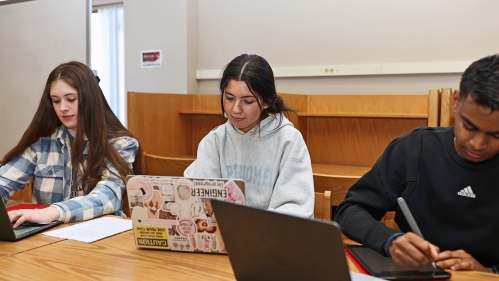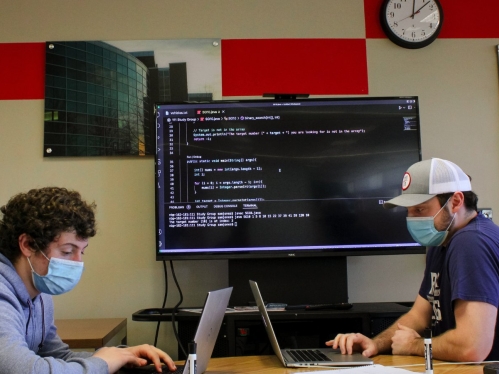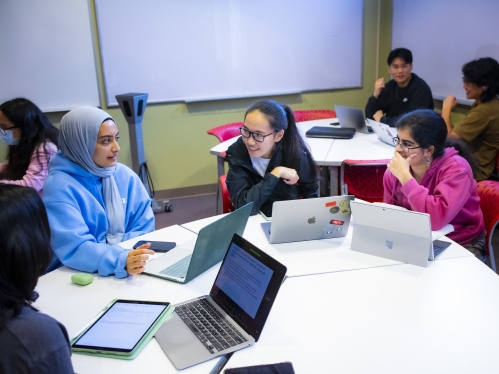
Group work, for some, is another way of saying teamwork. It can help us to divide work and increase productivity. It allows for the utilization of different skills, knowledge, and experiences of a variety of individuals. Group work can help us form relationships and support one another. It can help us to build responsibility and trust between classmates and colleagues.
And while group work can present certain challenges, we have strategies and tips for how to effectively work in groups.
How Does Group Work Benefit Me?


Why is your instructor asking you to work in groups? There are actually many benefits:
Groups have more information than a single individual. Groups have a greater well of resources to tap and more information available because of the variety of backgrounds and experiences.
Groups stimulate creativity. In regard to problem solving, the old adage can be applied that “two heads are better than one.”
People remember group discussions better. Group learning fosters learning and comprehension. Students working in small groups have a tendency to learn more of what is taught and retain it longer than when the same material is presented in other instructional formats (Barkley, Cross & Major, 2005; Davis, 1993).
Decisions that students help make yield greater satisfaction. Research suggests that students who are engaged in group problem solving are more committed to the solution and are better satisfied with their participation in the group than those who were not involved.
Students gain a better understanding of themselves. Group work allows people to gain a more accurate picture of how others see them. The feedback that they receive may help them better evaluate their interpersonal behavior.
Team work is highly valued by employers. Well developed interpersonal skills were listed by employers among the top 10 skills sought after in university graduates (Graduate Outlook Survey, 2010).
Group work promotes student learning and achievement. Students engaged in group work, or cooperative learning, show increased individual achievement compared to students working alone. Group work also creates opportunities for critical thinking and to engage in process skills critical for processing information, and evaluating and solving problems, as well as management skills through the use of roles within groups, and assessment skills involved in assessing options to make decisions about their group’s final answer.
Students build skills. Group work enhances communication and other professional development skills.
How to Be Effective in Groups
Working in groups means that you need to share your knowledge and ideas with other students. To do so, you need to:
- Think carefully about your own ideas before presenting or explaining them to others
- Expand your own awareness by taking account of the knowledge and ideas of others
When you work as a group on a project or assignment, you have the opportunity to draw on the different strengths of group members to produce a more extensive and higher quality project than you could complete on your own. To do this effectively, you need to learn group work skills, which are not only important to your academics, but also key to your professional development.
- Interpersonal skills:
- Building positive working relationships
- Communicating effectively in meetings
- Negotiating to agree on tasks and resolve conflicts
- Accommodating people with different cultural orientations and work habits
- Process management skills:
- Identifying group goals and dividing work
- Planning and complying with meeting schedules and deadlines
- Managing time to meet group expectations
- Monitoring group processes and intervening to correct problems
- Ensuring each group member contributes in an equitable way
Steps for Successful Groups


Effective group work does not happen by accident. It involves deliberate effort, and because there are many people involved it must not be left up to memory; good note taking is essential. Following these steps will help you and your group to work effectively together.
Have clear objectives. At each stage you should try to agree on goals. These include a timetable for progress on the project as well as more immediate goals (e.g. to agree on an approach to the assignment by Friday). Each meeting or discussion should also begin with a goal in mind (e.g. to come up with a list of tasks that need to be done).
Set ground rules. Discussions can become disorderly and can discourage shyer group members from participating if you don't have procedures in place for encouraging discussion, coming to resolution without becoming repetitive, and resolving differences of opinion. Set rules at the outset and modify them as necessary along the way. An interesting rule that one group made was that anybody who missed a meeting would buy the rest of the group a cup of coffee from the coffee shop. Nobody ever missed a meeting after that.
Communicate efficiently. Make sure you communicate regularly with group members. Try to be clear and positive in what you say without going on or being repetitive.
Build consensus. People work together most effectively when they are working toward a goal that they have agreed to. Ensure that everyone has a say, even if you have to take time to get more withdrawn members to say something. Make sure you listen to everyone's ideas and then try to come to an agreement that everyone shares and has contributed to.
Define roles. Split the work to be done into different tasks that make use of individual strengths. Having roles both in the execution of your tasks and in meetings / discussions can help to make a happy, effective team. See Sharing and organizing work for more information.
Clarify. When a decision is made, this must be clarified in such a way that everyone is absolutely clear on what has been agreed, including deadlines.
Keep good records. Communicating on the online discussion for your group provides a good record of discussion. Try to summarize face-to-face discussions and especially decisions, and post them to the online discussion so that you can refer back to them. This includes lists of who has agreed to do what.
Stick to the plan. If you agreed to do something as part of the plan, then do it. Your group are relying on you to do what you said you would do not what you felt like doing. If you think the plan should be revised, then discuss this.
Monitor progress and stick to deadlines. As a group, discuss progress in relation to your timetable and deadlines. Make sure that you personally meet deadlines to avoid letting your group down.
Surviving Challenging Scenarios
When working in groups, you may come across a variety of potentially challenging scenarios. Remember these tips to help you navigate and better manage those situations.
- If a group member insists on having their own way or is resistant to collaborating:
- Try some friendly but direct negotiation. Let them know that the group doesn't agree, and offer some compromises. They may not realize they come off as bossy and may be easier to work with than you thought.
- When a group member refuses to negotiate, take the higher ground and be polite, stand up for yourself, and do not let the group member filibuster the debate. If necessary, accept the differences of opinion and report them in the final paper or presentation.
- Get the professor involved if a group member continues to dominate discussions without contributing to moving the project forward.
- If a group member sees group work time as more of a time to socialize:
- To some degree, this may encourage good communication and help group members work better together, but not if the group member is steering everyone off task and wasting valuable meeting time.
- Communicate with the group member and politely tell them that the group needs to stay on task.
- Create strict meeting agendas to help facilitate efficiency.
- Suggest a fun social outing after the group meeting or project is over, as in, "Let's concentrate and get this done, and then we'll go out for pizza”.
- If a group member seems to be too busy to meet:
- Keep in mind they may be balancing school with a full-time job, family, or other major commitments.
- Share schedules among group members and avoid particularly busy times (i.e. other papers due, internships, mid-term exams, rush, etc.).
- Make accommodations:
- Arrange to have as few meetings as possible and instead communicate through email.
- Assign busy group members tasks that have flexible deadlines.
- Communicate about what group members need, and understand that reasonable accommodations are expected.
- If there is a pattern of a group member being too busy, particularly right before work is due, consider asking your professor to intervene. This may be a result of personal, private issues, and your professor should help to resolve them.
- If a group member seems to always be negative:
- Acknowledge the issue that's driving their negativity and ask about what they find positive, then build upon that to move everyone forward.
- If the answer is "nothing," remain positive and enthusiastic to help prevent the negativity from sapping the group's energy and focus.
- If the negativity persists, ignore it and tell the person you’d prefer to move on to more productive subjects.
- If the negativity appears to reflect stress, consider encouraging them to seek assistance from the professor.
- Acknowledge the issue that's driving their negativity and ask about what they find positive, then build upon that to move everyone forward.
- If a group member is not "pulling their weight”:
- Find out if the group member has a problem, such as an overloaded schedule or a lack of confidence about their ability to contribute to the group, then try to offer some reasonable accommodations.
- Inform the group member politely that the others are feeling overburdened and would like them to pitch in more.
- If being persistent doesn't work, consider getting the professor involved. Professors should only be consulted when there is a serious problem because you need to learn how to deal with group problems yourself (it's one of the reasons group projects are assigned). Nonetheless, a group member who neglects their work is a serious problem.
More Group Work Resources
MindMeister: This tool allows groups to work on one mind map document that can be used in the early phases of group work for planning or brainstorming, or it can be used as the primary collaborative document for the duration of the project depending upon the nature of the assignment. There are numerous templates, mind maps, project planning, SWOT analysis and more. It can be used asynchronously, but also includes a live chat feature.
Google Docs: Another excellent tool given its ease of use, flexibility and comment tools which are conducive to group work. I worked with this tool throughout graduate school for group projects, and still use Google Docs for project management at my workplace. It includes several document types, including Word, Presentation and Excel. It also features live chat.
BigMarker: A new tool, it looks comprehensive, it includes live synchronous video chat (useful for groups wanting to discuss in real-time) with the added capability of recording which can be viewed by group members unable to attend the live chat, and collaborative document sharing similar to Google Docs for asynchronous communication. It looks powerful and promising.
SlideRocket: A top-rated application that creates ‘stunning’ presentations that allows groups to work collectively on one presentation document. The application is easy to embed within discussion forums of the Learning Management System platforms or web pages. Each document has a unique URL, which can be submitted to the instructor for viewing.
Skype: Tried and true, Skype was one of the first video chat tools offered for free, and is reliable and easy to use. Another benefit is that students are likely to have Skype accounts and be familiar with it. It is a synchronous tool, a negative factor, however in many cases group members can agree upon a convenient time. Skype is also an effective tool for course instructors to have video meetings with groups or individual students to discuss progress or concerns.
Sources
- Infed.org: What is Group Work
- UNC Wilmington Journal of Effective Teaching
- Center for Teaching and Learning at Washington University Benefits of Group Work
- Five Basic Elements of Cooperative Learning
- Guide to Group Work
- USC Libraries Writing Guide: Survival Skills
- 5 Tools and Strategies that Support Group Collaboration Online


